AFL 2021: How clubs will operate, the next financial hit, membership fears and why streamlined footy departments are good for the game
Clubs are bracing for a potential membership and sponsorship exodus in 2021, with fears the financial hardships of the pandemic are yet to be felt. Will you keep your membership? HAVE YOUR SAY.
AFL News
Don't miss out on the headlines from AFL News. Followed categories will be added to My News.
Eddie McGuire’s doomsday “run on the clubs” by members may yet eventuate.
Western Bulldogs president Peter Gordon says he fears the competition’s already cash-strapped clubs face an even bleaker financial outlook in 2021 because of the coronavirus flow-on effect.
Clubs are also anxiously awaiting advice on whether the variable balance funding they’ve been receiving from the AFL over many years will be restored, at least in part.
Loyal footy fans came to the rescue of clubs in 2020, with about 90 per cent of paid-up members honouring their subscriptions.
Kayo is your ticket to the best sport streaming Live & On-Demand. New to Kayo? Get your 14-day free trial & start streaming instantly >
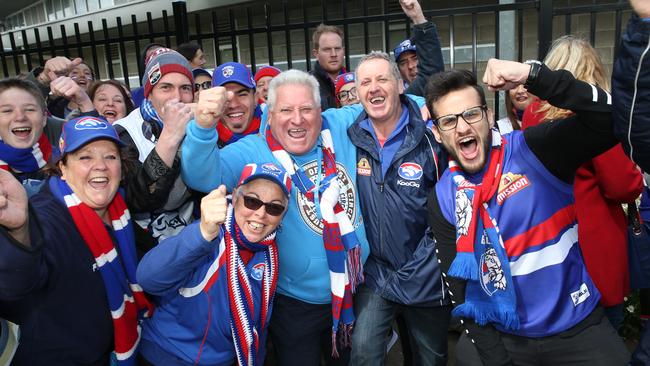
PART 1: HOW THE AFL IS PLANNING FOR 2021
McGuire famously warned in April that clubs would go to the wall if big numbers of members demanded refunds.
Gordon told the Herald Sun memberships, sponsorships and the restoration of variable AFL distributions will be crucial in determining the financial health of some clubs next season.
“The next big problem not just for the Bulldogs but for most clubs comes in 2021,” Gordon said.
“Members who stayed incredibly loyal in 2020 are about to be asked to sign up again in circumstances where they don’t know what sort of value for their membership money they are actually going to get.
“They already feel, rightly, that they’ve left their hard-earned in their club in 2020 for little or no return beyond the emotional.
“Membership for 2021 requires supporters to take a leap of faith – both that there will be games and that as members, they will be able to get to games.”
Clubs are exploring alternative membership packages, including changes to reserved seating arrangements.
“For a lot of our members, their reserved seat is a very big part of the value that they get,” Gordon said.
“They’ve gotten to know the people who sit next to them, behind them and in front of them over many years, and we are conscious of that, but at the same time, we are uncertain as to whether 2021’s COVID requirements will actually allow people to bunch up next to each other like in the past.
“We need to maintain the flexibility to seat our members at distances that the AFL and the Victorian government may mandate. It’s complicated and we’ve had a bit of push back from members on that. Once we explain it, most of our members understand.
“The whole industry remains vulnerable to another COVID spike; and while we’re all happy with recent COVID numbers in Victoria, what we are now seeing in America and Europe is a stark reminder that this virus, especially at the start of winter, can come back quickly and come back hard …. and if it does, it will hit footy.”
Gordon also said sponsorships, and not just the major ones, were another part of “lifeblood of a lot of clubs”.
“Every club has its major sponsors, but you’ve also got a series of smaller sponsors and for most of them, electing to continue to put ten or twenty grand into their footy club is as much an emotional decision as it is a marketing one,” he said.
“And even as a marketing one, it’s an element of discretionary expenditure … pretty much the first expense lopped off in tough times.
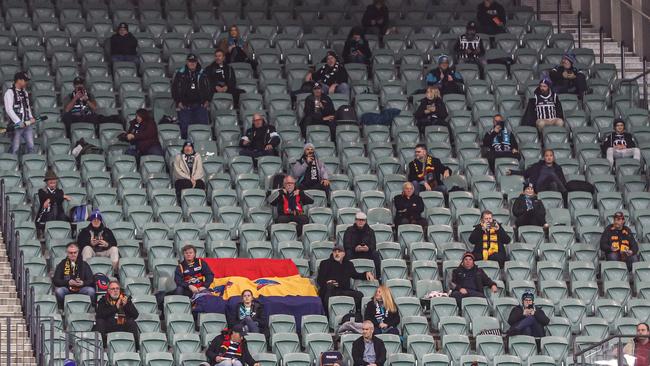
“Taking a helicopter view, when you add all these vulnerable areas up, that’s where the total projected losses for 2021 can get scary. That’s why 2021 remains a worry.”
Five of the game’s richest clubs – West Coast, Richmond, Collingwood, Essendon and Hawthorn – are fighting for AFL distributions next year at least equal to the size of the salary cap.
“If that doesn’t occur I would love the AFL to take on board the guidelines that operate for commercial companies in terms of transparency and reporting,” Hawks boss Jeff Kennett said.
“They don’t do that. In a large company, whether it be Seven West Media or Wesfarmers or Qantas, when a dividend is paid, they don’t vary the dividend spending on the wealth of the shareholder or the size of the shareholding.
“I can’t believe that Richard Goyder and the majority of that commission, who consider themselves to be commercial Group A people, can’t see the wisdom of applying the same principles.”
Gordon responded: “I can understand Jeff fighting for as much for Hawthorn as he can. Good luck to him. He’s a strong president of a strong club. He just needs to understand that the many clubs who don’t get invited to the meetings of the richest five, need that extra bit of AFL support that has been part and parcel of the unprecedented success of the AFL over the last 10 years.”
PART 1: WHY HUBS COULD RETURN IN WORST-CASE SCENARIO
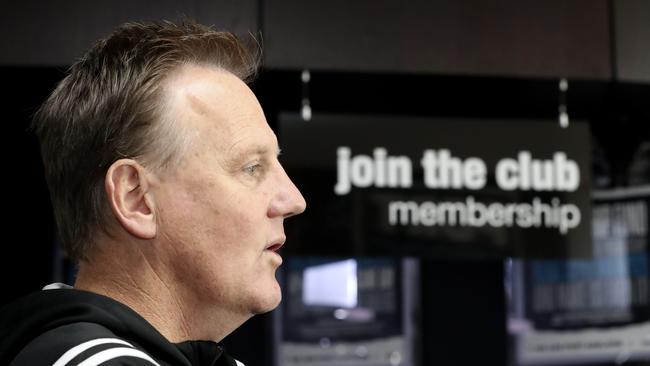
Port Adelaide’s outgoing chief executive Keith Thomas said all clubs had taken a “significant hit”.
“A lot of good people have been lost to the industry and it will take several years to fully recover,” he said.
“Most of our staff will continue to work from home through until the new year. The COVID impact has been severe.
“Close to 40 per cent of our administrative roles have been made redundant.”
He also said Port Adelaide’s China strategy would remain important, despite games in Shanghai unlikely for some time at best.
“Our embrace of China broadens our commercial appeal national and internationally … which I believe remains incredibly important,” Thomas said.
MORE NEWS
AFL’s billion dollar season was twice turned around from the brink, reveals AFLPA boss
‘Outgrown itself’: Streamlined footy departments a win for the game
The COVID-19 crisis has all but ended the AFL’s football department “arms race”, but Western Bulldogs boss Peter Gordon is confident clubs can become smarter and more resourceful in the future.
Gordon said the explosion of spending on football budgets in recent seasons was an unsustainable model for a game that had “outgrown itself”.
And while he feels for those employees cast out in the purge, he believes the downsizing will make for a more streamlined, sustainable competition.
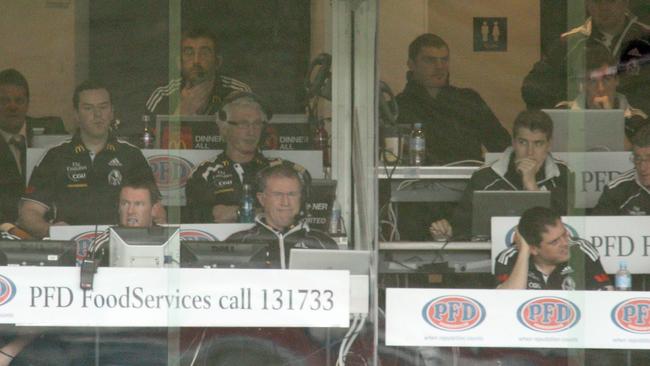
“I feel sorry for everyone who lost a job, but the fact is, in the early 2000s, the industry got by with a very high standard of football with no more than three or four assistant coaches per club,” Gordon said.
“I don’t think the industry should aspire to get back to 2019 where it almost seemed that virtually every player had their own bespoke assistant coach and some of the photographs we saw of coaches boxes overflowing with coaches, assistant coaches, directors of coaching, statisticians, opposition analysts, forward scouts, data analysts and high performance managers.
“Whilst it’s always great to be able to provide jobs, those sorts of images hit home to a lot of senior people at the AFL as a really potent symbol of an industry that had outgrown itself.
“It grew out of an issue where the biggest clubs thought that, even though they had to stick to the same player salary cap as everyone else, they could still exploit the advantages that wealth gave them with bigger and better coaching departments, which led to both the AFL and the smaller clubs feeling that equalisation principles meant they had to up the ante for all other clubs to match it.”
Gordon said “the fact that a year or two ago you had players at a club getting $12 million and the rest of the footy department getting another $9 million in a way speaks for itself.”
“Surely the players ought to be getting the lion’s share of the available money in footy departments. They put on the show. Forty-five per cent of direct football spending going to people who are not actually on the field playing is kind of ridiculous when you think about it.
“It became an arms race the AFL had to fund and the total cost to the industry ballooned in the end by almost $100 million a year. A $9.5 million soft cap turned out to be a luxury we couldn’t afford when COVID struck. ”
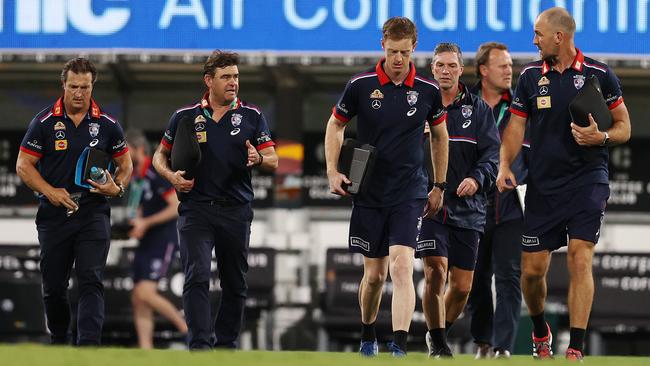
MORE AFL NEWS
Every 2019 AFL trade deal ranked from 1-29
How the Bombers could turn Joe Daniher free agency compensation pick into draft bonanza
James Hird’s dad urges Bombers to name and shame board ‘moles’ who betrayed his son
Originally published as AFL 2021: How clubs will operate, the next financial hit, membership fears and why streamlined footy departments are good for the game
